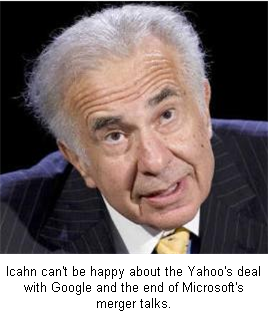Yahoo's Google ad deal: Savior or mistake?

Yahoo has made it official: It is teaming up with Google on search advertising, but the ripple effects--both short-term and long-term--are just beginning.
The two companies have announced a broad agreement where Yahoo uses Google's text advertising, but stops short of completely outsourcing search. Among the key parts of the deal:
- The Yahoo-Google partnership is non-exclusive and Yahoo controls the user experience and where the ads run.
- Yahoo will still use its own Panama marketplace when the monetization is comparable to what Google could provide.
- Google and Yahoo will make their instant messaging services interoperable.
- The agreement has a term of up to ten years: a four-year initial term and two, three-year renewals at Yahoo!'s option.
- Either party can terminate the deal in the event of a change in control. The catch: Yahoo has to pay a termination fee if the agreement is terminated as a result of a change in control that occurs within 24 months. The termination fee is $250 million, subject to reduction by 50 percent of revenues earned by Google under the agreement. That's basically an anti-Microsoft takeover clause.
- And most importantly, Google will provide $250 million to $450 million in incremental cash flow. After 12 months of implementation, Yahoo expects "an $800 million annual revenue opportunity."
It's clear that the Google deal has thwarted Microsoft's bid. Yahoo and Microsoft both confirmed that talks between the two companies are over. What remains to be seen is whether activist investor Carl Icahn will react. After all, Icahn's entire plan for Yahoo rested on Microsoft's willingness to buy the company.

Also see: Why Internet companies are attractive takeover targets: They can’t manage
On a conference call, Decker said that the Google deal provides "flexibility" that allows Yahoo to use Google as a monetization lever while allowing the company to focus on its starting point strategy--the portal, media and display businesses.
"We're excited by potential and how it accelerates our long term strategy," said Decker. "The flexibility allows Yahoo to focus and use paid search results where comparable value. Yahoo has full and unfettered control over the user experience and we decide how much of search inventory (is allocated to Google)."
She added that Google will pay Yahoo on a TAC basis. Yang said the Google deal "is a good long-term opportunity for Yahoo."
For its part, Google said on its official blog that its pact "is good for users, advertisers and publishers. By offering Google's industry-leading technology to Yahoo, the whole system becomes more efficient, and everyone benefit."
Execs tout open strategy
Yang and Decker noted that the Google deal is about bolstering the company's open strategy--an argument that analysts on the conference call didn't seem to buy.Nevertheless, Yang played along. Here's Yang's official line:
"We believe that the convergence of search and display is the next major development in the evolution of the rapidly changing online advertising industry. Our strategies are specifically designed to capitalize on this convergence -- and this agreement helps us move them forward in a significant way. It also represents an important next step in our open strategy, building on the progress we have already made in advancing a more open marketplace."
Under this vision, Yahoo would use its AMP marketplace, Panama or Google depending on what was necessary for monetization. In other words, Yahoo is eyeballing monetization levers. There are also a few nuggets that give Yahoo an out in the event of a change in control of either Google or Yahoo. Meanwhile, the Google deal only impacts Yahoo's U.S. and Canada operations, which leaves the company's extensive Asia operations in tact.
The elephant in the room: Why not just buy Google ads?
For Yahoo, the Google deal satisfies a few pressing needs:- Google gets rid of Microsoft;
- It bolsters short-term results;
- And allows Yahoo enough options to make its AMP strategy viable.
But the big question is why wouldn't an advertiser just buy Google and hope for the chance of being on Yahoo?
Analysts came back to that question a few times and Yahoo's answers were less than satisfying. Yahoo's point is that for display it is still a must buy. The text advertising business is a different animal.
However, that argument doesn't completely work. If all I'm buying is text ads I know can deliver ROI I'm already inclined to go with Google. The Yahoo deal just re-emphasized that point.
Is that perception entirely true? Maybe not. But in the ad business perception is reality and Yahoo looks like it just got a bail out from Google. Did Yahoo just hurt its long-term prospects in the name of fending off Microsoft?
What now Carl?
Icahn can't be happy about the Google deal--essentially a nuclear bomb on his big shareholder value plan. Here's Icahn's Thursday afternoon: Yahoo confirms talks with Microsoft are off. Microsoft confirms it's not interested. Carl's holding falls.Well this plan certainly hasn't turned out as expected. What's next? Another Dear Roy Bostock letter? Or should Carl just walk away? Sometimes it's not easy being an activist billionaire.
Usually Carl can push boards around and get what he wants. Yahoo just goes scorched earth reportedly nearing a Google search deal that Jerry Yang & Co. knew would push Microsoft away.
Shareholder value? There isn't any. You can argue all you want about how Yang and the board should be tossed, but Icahn appears to be left holding the bag here. He's a man with a thin Yahoo plan (Microsoft) and that plan just walked away.
I can't wait for Icahn's response, which can be summed up in one word: SELL!